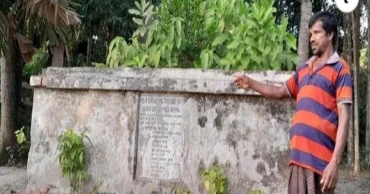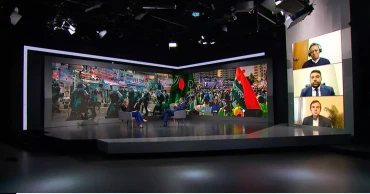1971
Nation observing ‘Martyred Intellectuals Day’ with due respect
The nation is observing the ‘Martyred Intellectuals Day’ in a befitting manner on Sunday (December 14, 2025) to commemorate the intellectuals killed systematically by Pakistan occupation forces and their local collaborators at the fag-end of the Liberation War in 1971.
Marking the day, President Mohammed Shahabuddin paid homage to the nation's intellectuals at the Martyred Intellectuals Memorial in Mirpur at 7am.
Later, he stood there silently for a while.
Followed by the President, Chief Adviser Professor Muhammad Yunus also paid tribute to the nation's finest intellectuals and observed a silence for a while there.
Later, all walks of life were allowed to pay tribute to the valiant people of the country who were systematically killed the Pakistan occupation forces, in collaboration with their auxiliary forces.
Read more: Jamaat Ameer calls on nation to observe Martyred Intellectuals Day, Victory Day with due respect
On this day in 1971, the country’s renowned academicians, doctors, engineers, journalists, artists, teachers and other eminent personalities were dragged out of their homes, blindfolded and taken to unknown places and then brutally tortured and murdered.
Their bodies were later dumped at Rayerbazar, Mirpur and some other killing fields in the capital.
Sensing an imminent defeat, the Pakistani forces and their local collaborators like Al-Badr, Al-Shams and Razakar committed the cold-blooded mass murders aiming to annihilate the country's intelligentsia and cripple emerging Bangladesh intellectually.
Among the martyred intellectuals are Prof Munier Chowdhury, Dr Alim Chowdhury, Prof Muniruzzaman, Dr Fazle Rabbi, Sirajuddin Hossain, Shahidullah Kaiser, Prof GC Dev, JC Guha Thakurta, Prof Santosh Bhattacharya, Mofazzal Haider Chowdhury, journalists Khandaker Abu Taleb, Nizamuddin Ahmed, SA Mannan (Ladu Bhai), ANM Golam Mustafa, Syed Nazmul Haq and Selina Parvin.
The interim government has chalked out elaborate programmes to commemorate the December 14 tragedy.
Read more: Nation to observe Martyred Intellectuals Day on Sunday
The family members of the martyred intellectuals and freedom fighters are paying homage to the martyred intellectuals marking the day.
On the eve of the day, President Mohammed Shahabuddin and Chief Adviser Professor Dr. Muhammad Yunus issued separate messages on the occasion of the day.
Leaders and activists of different political and social organisations are also paying homage to the martyred intellectuals at Mirpur Martyred Intellectuals' Graveyard.
Special doa and munajat are scheduled to be offered at mosques, temples and churches marking the day.
Bangladesh Television and private television channels are broadcasting special programmes highlighting the significance of the day.
Read more: President Shahabuddin, Prof Yunus pay tributes to martyred intellectuals
National dailies also published special supplements marking the day.
2 months ago
Eminent Indian author, 1971 war correspondent Gita Mehta dies
Eminent Indian author, filmmaker, and journalist Gita Mehta died at her Delhi residence on Saturday, She was 80.
She is survived by her son.
Mehta, a war correspondent for a foreign television channel during 1971, had extensively covered the 1971 Liberation War of Bangladesh.
Dhallywood’s modern-day ‘Starmaker’ Sohanoor Rahman Sohan dies at 57
Mehta, the elder sister of Odisha chief minister Naveen Patnaik, was married to renowned American publisher late Sonny Mehta, who passed away in Manhattan in December 2019 at the age of 77, report Indian media.
In 1979, Gita wrote her first book ‘Karma Cola’, a collection of essays on Indian spirituality and the perception of the Western world about it.
During the years 1970–1971, she was a television war correspondent for the US television network NBC and produced four documentaries.
Ex-state minister for relief Ebadur dies at 85
Her film, a compilation of the Bangladesh revolution, Dateline Bangladesh, was shown in cinemas both in India and abroad.
Prime Minister Narendra Modi condoled her death, with a post on X: "I am saddened by the passing away of noted writer Smt. Gita Mehta Ji. She was a multifaceted personality, known for her intellect and passion towards writing as well as film making. She was also passionate about nature and water conservation. My thoughts are with @Naveen_Odisha Ji and the entire family in this hour of grief. Om Shanti."
'Hok Kolorob'-famed lyricist Rajib Ashraf no more
2 years ago
Demand for global recognition of 1971 genocide included by UN
The UN Human Rights Council has included the demand for international recognition of genocide committed by the Pakistani military forces and their collaborators against the Bangalis during the Liberation War of Bangladesh in 1971.
The demand is included as agenda item 3 of the UN Human Rights Council’s 53rd session scheduled for June 19- July 14.
Read more: Researchers, scholars urged to present facts of Bangladesh genocide before global community
UN Secretary-General Antonio Guterres received the written statement issued by the Bangladeshi diaspora organisation, Stichting BASUG (Bangladesh Support Group) with Special Consultative Status of the Economic and Social Council (ECOSOC) of the UN along with pro-liberation organisations seeking to establish a secular Bangladesh -- Aamra Ekattor, Projonmo '71, European Bangladesh Forum, and Seraji Foundation.
The statement, which reiterated their demand for the “International Recognition of the 1971 genocide”, was circulated in accordance with Economic and Social Council (ECOSOC) resolution 1996/31 on 29 May.
Read more: West must recognize 1971 genocide Pakistan army committed in Bangladesh: Shahriar Alam
2 years ago
Leading Canadian museum reviewing submission on ’71 genocide for display
The Canadian Museum for Human Rights (CMHR) is now reviewing a submission for recognition of the "genocide" perpetrated by the Pakistani occupation forces in Bangladesh in 1971 to it last year.
CMHR is a federally-managed museum whose role includes preserving and promoting Canada’s heritage at home and abroad; contributing to the collective memory and sense of identity of all Canadians; and inspiring research, learning, and entertainment that belong to all Canadians.
As part of the review process, Jeremy Melvin Maron, curator of the Holocaust and Genocide Contest at CMHR and in charge of reviewing and recommending the submission to the concerned authorities of CMHR for acceptance, will be in Dhaka from February 6 to 12 this year.
During his stay in Dhaka, Maron would visit some of the sites where the genocide took place and meet the members of the families of the victims and the survivors. The Liberation War Museum, Bangabandhu Memorial Museum and other museums.
He will also meet senior officials and policymakers of the Canadian Ministry of Foreign Affairs and other national experts in genocide issues. The Ministry of Foreign Affairs and Liberation War Museum will jointly organise and manage his visit to Bangladesh.
Once the submission is accepted, CMHR would permanently display the "Evidences and Exhibits of Genocide" in the museum.
At the same time, the Year of the Birth of Bangladesh and the Portrait of Father of the Nation Bangabandhu Sheikh Mujibur Rahman would also be placed in the "Time Stream" of the museum.
Acceptance of the submission and permanent display of "Evidences and Exhibits of Genocide" in the CMHR is an important step towards raising awareness about the genocide in 1971 and its recognition in Canada, the Bangladesh High Commission in Ottawa said Monday.
Earlier, the Bangladesh mission in collaboration with the Bangabandhu Centre for Bangladesh Studies in Canada, the Liberation War Museum Dhaka, the Centre for Genocide Studies of Dhaka University and the Conflict and Resilience Research Institute Canada made a submission for recognition of the genocide to CMHR.
After the submission, the Bangladesh High Commission organised an international seminar at CMHR participated by international experts, intellectuals, diplomats and academicians.
The seminar discussed the genocide in Bangladesh in 1971 and emphasised its global recognition.
Read more: Prominent persons demand recognition of 1971 killings as genocide
3 years ago
Apology from Pakistan publicly for 1971 atrocities first thing to do: Momen
Foreign Minister Dr AK Abdul Momen on Sunday said Bangladesh wants Pakistan to “seek apology publicly with a formal announcement” for the atrocities perpetrated against unarmed Bangalees in 1971.
“You first need to seek an apology publicly. Otherwise, I have a political reason….if it (apology publicly) happens first, I can argue for you. Otherwise, it will be very difficult for me. I can’t do that. It’s pure and simple,” he told reporters sharing what he conveyed to State Minister for Foreign Affairs of Pakistan Hina Rabbani Khar.
Read more: Bangladesh likely to get back the money borrowed by Sri Lanka: FM
Talking to media at State guesthouse Padma, Momen said Pakistan wants to enhance relations with Bangladesh but Bangladesh reminded that seeking apology publicly is the first thing to do.
Hina Rabbani had a meeting with Minister Momen in Sri Lanka's capital city Colombo on Saturday.
Momen visited Sri Lanka as a guest for the country's 75th Independence Day celebrations, for which the guest list was filled up mostly by neighbouring countries at the foreign minister level.
Responding to a question, Foreign Minister Momen said the Pakistan State Minister did not make any direct reply to his request but mentioned that they have some limitations.
The Foreign Minister said if there is an issue of improving relations between Bangladesh and Pakistan that must begin with working in the economic area.
Read more: Dhaka eyes deeper relations with Latin American countries; Argentine FM due Feb 27
He urged the Pakistan State Minister to withdraw the restrictions to make the trade relations fairly balanced.
Momen, along with other South Asian ministers, attended the "Independence Parade" featuring march-past, fly-by, and parachute display by the joint forces at the Galle Face Green in Colombo Saturday.
State Minister for Foreign Affairs of India V Muraleedharan also met the foreign minister of Bangladesh.
They discussed the upcoming bilateral visits and issues of mutual interest and emphasised trade and commerce for the benefit of the people of the two countries.
All the ministers from South Asian countries appreciated the current government under Prime Minister Sheikh Hasina for the continued economic advancement of Bangladesh.
On Saturday evening, Momen attended a reception hosted by the Sri Lankan President in honour of visiting foreign ministers/dignitaries from other South Asian countries – namely, India, Nepal, Bhutan, and Pakistan – and the secretary general of the Commonwealth as well as state minister for foreign affairs of Japan.
3 years ago
Pakistan should formally apologise for 1971 atrocities: Momen tells Hina Rabbani
Bangladesh has said Pakistan "should formally apologise" for the atrocities perpetrated against unarmed Bangalees in 1971.
Foreign Minister AK Abdul Momen conveyed this to State Minister for Foreign Affairs of Pakistan Hina Rabbani Khar when she met her Bangladesh counterpart in Sri Lanka's Colombo Saturday.
Momen is now in Sri Lanka as a guest for the country's low-key 75th Independence Day celebrations, for which the guest list was filled up mostly by neighbouring countries at the foreign minister level.
The Bangladesh foreign minister, along with the others, attended the "Independence Parade" featuring march-past, fly-by, and parachute display by the joint forces at the Galle Face Green in Colombo Saturday.
Sri Lankan President Ranil Wickremesinghe conveyed Sri Lanka's gratitude to the Bangladesh government and Prime Minister Sheikh Hasina for the timely assistance as the country battles to rebuild its economy.
State Minister for Foreign Affairs of India V Muraleedharan also met the foreign minister of Bangladesh.
They discussed the upcoming bilateral visits and issues of mutual interest and emphasised trade and commerce for the benefit of the people of the two countries.
All the ministers from South Asian countries appreciated the current government under Prime Minister Sheikh Hasina for the continued economic advancement of Bangladesh.
In the evening, Momen attended a reception hosted by the Sri Lankan president in honour of visiting foreign ministers/dignitaries from other South Asian countries – namely, India, Nepal, Bhutan, and Pakistan – and the secretary general of the Commonwealth as well as state minister for foreign affairs of Japan.
The foreign minister will return to Dhaka Sunday.
Read more: Prominent persons demand recognition of 1971 killings as genocide
3 years ago
Why hasn’t the UN recognised 1971 Bangladesh Genocide yet?
Seventy-five years after the UN Convention on the Prevention and Punishment of the Crime of Genocide came into force, one of its glaring failures has been not recognising the 1971 Bangladesh genocide and the 2017 genocide against the Rohingyas in Myanmar.
This not only saddens us in Bangladesh, it also upsets many who have followed large scale massacre of human beings in various parts of the post-colonial world.
Polish Jewish refugee lawyer Raphael Lemkin coined the word “genocide” in 1943 to describe the killing and destruction of people. The word is derived from the Greek “genos” (people, tribe or race) and the Latin “cide” (killing) against the backdrop of the Holocaust, that Winston Churchill said was a “crime without a name”. But Churchill’s double-standards remained the enduring feature of Western standpoint on how they look at a genocide or large scale engineered deaths.
Churchill, the British “hero” who guided the Allies to victory in World War II and who attacked Hitler and the Nazis over the Jewish Holocaust, has been held responsible for triggering the Bengal famine that led to 3 million deaths in what was then undivided Bengal, the largest province of British India.
Read more: 'Recognising the Bangladesh Genocide of 1971': ICSF welcomes US Congress initiative
Madhusree Mukerjee, whose “Churchill’s Secret War” created waves and rattled many a British colonial apologist, has gone on record to equate Hitler’s extermination of 10 million Jews with Churchill’s presiding over the death of three million Bengalis through a famine orchestrated by policies linked to the British war effort.
On December 9, 1948, the international community formally adopted a definition of genocide within the 1948 Convention – essentially enshrining the message of “never again” in international law.
Rachel Burns of the York University questions whether the convention has achieved what it set out to do and focused on three of its key areas of failure.
· First, the very application of the term “genocide” is applied too slowly and cautiously when atrocities happen.
· Second, the international community fails to act effectively against genocides.
· Third, too few perpetrators are actually convicted of their crimes.
Read more: Declare Pakistan army action in 1971 ‘Genocide’: US congressmen introduce resolution
Burns points to the many genocides that have occurred since the 1948 Convention and its ratification in 1951, and then points to the only three that have been legally recognised – and led to trials – under the convention: Rwanda in 1994, Bosnia (and the 1995 Srebrenica massacre), and Cambodia under the 1975-9 Pol Pot regime.
Burns refers to the widespread killing and displacement of Yazidi by IS and of Rohingyas in Myanmar which are ongoing and recognised by the UN as a whole, but are yet to be officially recognised as genocides by some individual states. Similarly, 13 years after atrocities took place in the Sudanese region of Darfur, criminal investigations continue but no official charges of genocide have been made under the convention.
Political scientist Adam Jones names the genocides committed under Saddam Hussein against the Kurds in 1988-91 in Iraq, and the genocide committed by West Pakistan forces against Bangladeshis in 1971.
“And the list of ‘genocides’ that might fall under the UN definition is frighteningly long. The International Criminal Court is investigating several states in which human rights violations and war crimes ‘may’ have occurred,” says Rachel Burns.
Read more: 1971 genocide: Need to work together to get recognition from UN, says DU VC
As a passionate and patriotic Bangladeshi, I would like to argue that the UN should prioritize recognising the 1971 East Pakistan genocide against Bengalis for three reasons:
· The number of people killed in then East Pakistan by Pakistani forces (regular army and collaborators) between March and December 1971 far exceeds the numbers of victims of the three genocides recognised by the UN. Nearly 3 million Bengalis of all faiths were massacred by the Pakistani forces. In comparison, 1.5 to 2 million deaths occurred at the hands of the murderous Khmer Rouge but these deaths were over a four year period between 1975 and 1979. Between 500000 to 650000 Tutsis were massacred by Hutus during the Rwandan civil war between April and August 1994. And the Balkan genocide casualty toll never crossed six digits.
· The genocide in East Pakistan (now Bangladesh) was not just limited to random killings but involved both targeted murders (of intellectuals to leave behind a brain deficit) and also largescale rapes (nearly 300,000) of Bengali women as well as arson.
· This genocide was carried out by the Pakistan army – and not by militias – which has since been designated by US and NATO as an “useful ally in the war against terror”.
Read More: Chitra erosion threatens mass grave of 1971 in Magura
A recognition of the 1971 East Pakistan genocide by the UN is not only important for the global body to regain its credibility and effectiveness but also to expose a military institution which is seen as of much strategic value in the West.
The West has been fooled, somewhat willfully, into believing that the Pakistan army is useful in fighting terror in Afghanistan. There is enough evidence now to suggest that the Pakistani generals were always running with the hare and hunting with the hounds. They were allowing US and NATO a springboard for anti-Taliban operations but were also allowing Taliban safe shelter, training and weapons in Pakistan, without which the Taliban would have never survived, let alone emerge victorious to take over the country.
The least the West, especially the US (which is very vocal about human rights violations in Bangladesh now), can do is to take the initiative to officially recognise the 1971 East Pakistan genocide. They should stop fooling their own citizens and taxpayers about the role of the Pakistani army in the war against terror. By recognising the 1971 genocide, they can hold the Pakistan army accountable for denying Bengalis the right to life during the Liberation War. Recognition of both 1971 East Pakistan genocide and the 2017 Rohingya genocide will help call out and expose two evil military institutions who threaten democracy and dignity of life in our part of the world. It is high time the West stops chasing phantoms and does its bit to punish mass murderers in our region. Otherwise, their sermons on human rights just ring hollow.
Read More: Brave Women Freedom Fighters of Bangladesh’s 1971 Liberation War
Seventy-five years after the UN Convention, Nobel laureate and Holocaust survivor Elie Wiesel’s “never again” for genocide remains “a prayer, a promise, a vow” but also a frequent reality. And their frequent recurrence owes much to how many genocides have gone unrecognised and unpunished.
Tarana Halim, an actress and lawyer, is a former Bangladeshi minister. She is now president of Bangabandhu Sanskritic Jote, a front for cultural movement against radicalism. She is also a member of Awami League central committee.
3 years ago
Chitra erosion threatens mass grave of 1971 in Magura
A mass grave where eight freedom fighters were buried in 1971 at Hajrahati village in Magura’s Shalikha upazila is currently under threat of erosion by the Chitra river.
On December 7, 1971, eight freedom fighters who had returned home after receiving training in India were apprehended by Razakars, who collaborated with the Pakistani occupation forces during the War of Liberation in 1971 and killed mercilessly on the bank of the Chitra river. Later, locals buried the bodies of the freedom fighters at the place of their murder.
The eight freedom fighters were Jodunath Guha, Panchanan Pal, Haripad Das, Nityandon Vadra, Monoranjan Dutta, Narugopal Ray, Suresh Kar and an unidentified man.
After entering Bangladesh crossing the Indian border in Kaliganj upazila of Jhenidah district, these freedom fighters fought bravely against the Pakistani military. They were caught and killed during the final stage of the Liberation War while.
“I still search for my brother Jodunath on the bank of the Chitra river. I go to the mass grave with his picture and cry out for my brother,” said Chobi Rani Adhikari, sister of one of the slain freedom fighters.
Chobi added that although it has been 51 years since the country became independent, the mass grave beside the Chitra river hasn’t been maintained properly.
Also Read: Independent candidate lands in jail ahead of Magura Zilla Parishad polls
“During monsoon, water from the river enters the grave. The grave will be washed away by the river someday if no measures are taken,” Chobi added.
Ratan Kumar Das, a local who was 13 during the Liberation War, said some seven to eight freedom fighters were going to Faridpur via Hajrahati during the final days of the war when they were apprehended and killed by Razakars of the area.
“Although we’ve requested the upazila administration time and again, no step has been taken by them to preserve the mass grave. Some officials of the administration have visited the grave multiple times and that’s all,” Ratan said.
SM Abdur Rahman, Joint Convener of Muktijoddha Sangsad’s district unit and a Deputy Commander during the Liberation War, said that family members of the slain freedom fighters gather at the grave every year and arrange events to commemorate their sacrifice.
“Bangladesh has been liberated through the sacrifice of the freedom fighters. It’s our duty to respect them. That’s why immediate steps are necessary to protect Hajrahati Mass Grave from ruin,” said Rahman.
3 years ago
Despite its 1971 role, spokesperson says Jamaat ‘committed to democracy’ since formation
Despite its widely documented role as collaborating with the Pakistani occupation forces in committing genocide during the Liberation War in 1971, a spokesperson of Jamaat-e-Islami has claimed that the party, since its formation, is “committed to democracy’.
Abu Bakar Molla, EU and UK spokesperson of Jamaat, was speaking on a TRT World current affairs programme, “The Newsmakers”, on December 21, 2022.
Jamaat-e-Islami actively opposed the creation of Bangladesh and helped Pakistani forces carry out genocide and crimes against humanity during the nine months of the Liberation War.
Read more: PM Hasina wonders how leftists could join hands with BNP and Jamaat
In its verdict against Ghulam Azam, the Jamaat ameer in 1971, the International Crimes Tribunal noted that Jamaat-e-Islami – under Ghulam Azam’s leadership – operated as a “criminal organisation” during the Liberation War.
Without naming any specific human rights organization, the Jamaat spokesperson said, “What about the international human rights community are saying… they are independent, they are neutral… international human rights community has given statements, saying that human rights are grossly violated in Bangladesh.”
Incidentally, Jamaat-e-Islami recently claimed that Indian forces were “behind the killings of intellectuals” at the end of the Liberation War. A claim The Daily Star reported as “yet another blatant attempt to distort history.”
During a virtual discussion on the occasion of Martyred Intellectuals Day, Jamaat leaders claimed that Bengali intellectuals were killed so that the country “could not stand without the support of a neighbouring country.”
Read more: Jamaat, which was behind killings of intellectuals in 1971, BNP's main associate: Info Minister
On the TRT World program, Abu Bakar spoke about supporting Bangladesh Nationalist Party (BNP) in its call for restoring the caretaker government system and demand for resignation of the current government.
Amir Khasru Mahmud Chowdhury, standing committee member of BNP, reiterated his party’s call for national election only under a caretaker government.
Also on the show, Barrister Shah Ali Farhad, former special assistant to Prime Minister Sheikh Hasina, said, “The (recent) protests are actually purely political party rallies of BNP. No evidence to suggest that they have any mass involvement. While rising costs of living are impacting citizens’ lives, they are well informed as to the global reasons behind the rise. Their confidence is on Prime Minister Sheikh Hasina to deliver results, as she has delivered over the last one decade… The government respects the freedoms of assembly and speech of BNP and their allies as long as no public security risk is involved. The fact that BNP organised rallies in all divisional cities is evidence of the government’s cooperation in this regard.”
3 years ago
‘The energy and magnetism in Sheikh Mujib’s voice in 1972 made me understand why he was a leader of the people’
Back in the country, whose birth she documented, after half a century – Anne de Henning effortlessly recalls those tumultuous times. The veteran photographer met Prime Minister Sheikh Hasina and the other surviving family members of Bangabandhu Sheikh Mujibur Rahman at Dhaka’s Dhanmondi 32 Memorial Museum on December 19, 2022 – an event she described as “an emotional family reunion”. Henning photographed Bangabandhu giving a speech at the first Council Meeting of Awami League in independent Bangladesh, in 1972. After Bangabandhu and most of his family members were brutally assassinated in 1975, his images were routinely destroyed. Henning’s colour photos of the Father of the Nation are among the few known to still exist.
During the Liberation War in 1971, when Pakistan army was not allowing foreign photographers to come here, what compelled her to undertake a perilous journey to Bangladesh?
Read more: Anne de Henning’s rare photos of Bangladesh’s birth, Bangabandhu to have Dhaka exhibit Dec 15-24
“I was in Kathmandu at the time, and I saw a dispatch in the local English paper… that trouble had erupted in (then) East Pakistan and that Pakistani authorities had closed the country to the foreign press. And I thought, well, I’m going to go there. As journalists and photographers, when you are told you can’t go somewhere, you know something is going on. So that’s where you want to go,” Henning said.
3 years ago



















